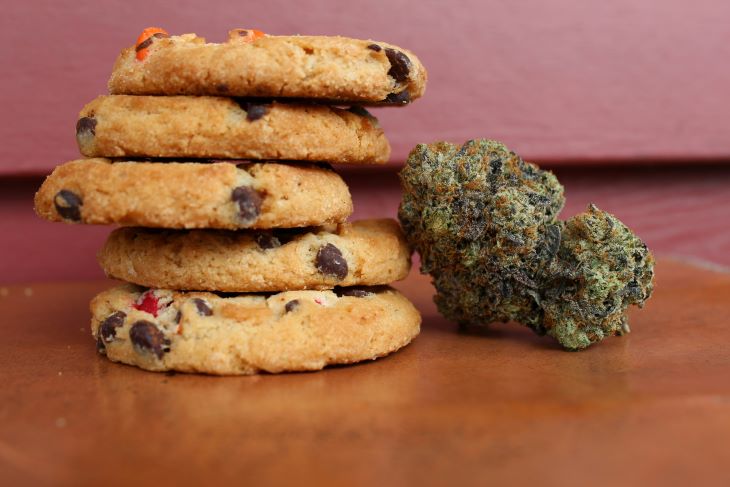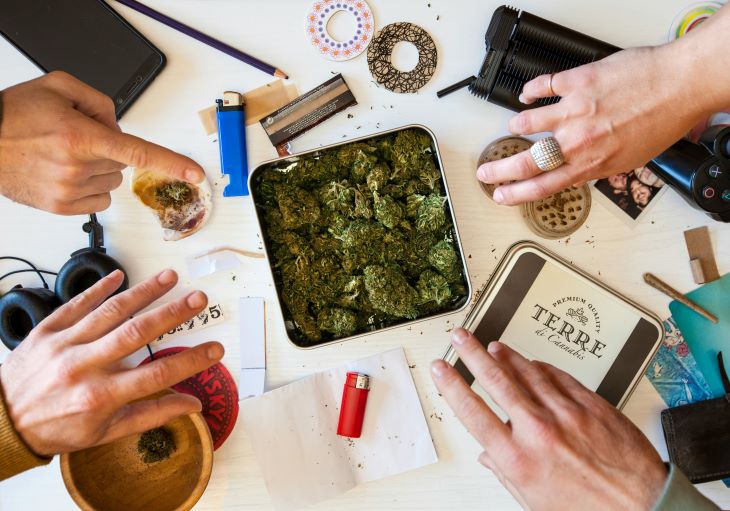We live in a fast-paced world where many individuals are suffering from anxiety disorders. The spectrum ranges from generalized anxiety disorder (GAD) to specific phobias, impacting daily life and mental well-being.
Amidst the limitations of conventional therapies and medications, there’s a growing curiosity and acceptance of alternative treatments for anxiety relief. Among these, cannabis has emerged as a prominent contender due to its perceived effectiveness and availability.
In this article, we take a further look into the science behind cannabis and anxiety, examining different strains and their suitability for managing anxiety symptoms. By understanding the mechanisms and nuances of cannabis use, individuals can make informed decisions about integrating it into their treatment regimen.
The Science Behind Cannabis and Anxiety
Endocannabinoid System: An Overview
Central to understanding cannabis’s effects on anxiety is the endocannabinoid system (ECS), a complex network of receptors and neurotransmitters throughout the body. It performs a role in regulating various physiological processes, including mood and stress response.
Read our “Understanding the Endocannabinoid System: A Guide for Medical Marijuana Patients”
Cannabinoids and Their Effects on Anxiety
THC vs. CBD: Contrasting Effects
Tetrahydrocannabinol (THC) and cannabidiol (CBD) are two primary cannabinoids in cannabis, each exerting distinct effects on anxiety. THC, known for its psychoactive properties, can sometimes exacerbate anxiety symptoms, especially in high doses. In contrast, CBD has shown promise in reducing anxiety without producing intoxicating effects.
Other Cannabinoids and Their Potential Roles
Beyond THC and CBD, cannabinoids like cannabigerol (CBG) and cannabinol (CBN) are also being studied for their potential therapeutic benefits in anxiety management. Their interactions with the ECS contribute to the overall effect of cannabis on anxiety.
Neurobiological Mechanisms of Anxiety and How Cannabis Interacts
Anxiety disorders stem from complex neurobiological mechanisms involving neurotransmitter imbalances and hyperactivity in certain brain regions. Cannabis interacts with these pathways, potentially modulating anxiety-related neural circuits and providing relief.
Clinical Research Findings: What Studies Say About Cannabis and Anxiety
Numerous studies have explored cannabis’s efficacy in alleviating anxiety symptoms. While findings are mixed, some indicate that specific cannabinoids and strains may offer relief for certain individuals. However, more rigorous clinical trials are needed to establish definitive conclusions.
Understanding Different Cannabis Strains
Indica vs. Sativa: Debunking the Myth
Traditionally, cannabis strains have been categorized as indica or sativa, each purportedly inducing different effects. However, modern research suggests that these distinctions are more about plant morphology than predictable psychoactive outcomes, challenging conventional wisdom.
Terpenes: The Aromatic Compounds Influencing Effects
Terpenes are aromatic compounds present in cannabis that contribute to its unique flavor and scent profile. More importantly, they may modulate the effects of cannabinoids, influencing whether a strain promotes relaxation or alertness, which is crucial in selecting a strain for anxiety relief.
CBD-Dominant Strains: Their Suitability for Anxiety Relief
Strains high in CBD and low in THC are often recommended for anxiety relief due to CBD’s potential anxiolytic properties. These strains offer the therapeutic benefits of cannabis without the intoxicating effects associated with THC.
THC-Dominant Strains: Potential Benefits and Risks for Anxiety
While THC-dominant strains can induce euphoria and relaxation, they may also increase anxiety levels, particularly in individuals sensitive to THC or prone to anxiety disorders. Understanding one’s tolerance and sensitivity is crucial when considering THC-rich strains for anxiety management.
Personalized Approach to Cannabis for Anxiety
Importance of Individualized Treatment
Anxiety disorders vary widely among individuals, necessitating a personalized approach to cannabis use. Factors such as tolerance, sensitivity, and medical history should inform decisions regarding strain selection and consumption methods.
Considerations When Choosing a Strain
- Sensitivity to THC
Individuals with low THC tolerance or heightened anxiety sensitivity should opt for strains with balanced THC ratios or high CBD content.
- Desired Effects and Potency
Understanding the desired therapeutic effects—whether relaxation, mood elevation, or stress reduction—helps in selecting a strain that aligns with personal goals.
- Terpene Profile
Considering the terpene profile of a strain can provide insights into its potential effects, guiding users towards strains that promote calmness or alleviate stress.

Image by Margo Amala on Unsplash.
Medical Marijuana Strains for Anxiety Relief
Medical marijuana has been increasingly recognized for its potential to alleviate anxiety symptoms. Various strains, each with unique properties, can provide different levels of relief. Below is a list of notable strains known for their effectiveness in anxiety relief.
1. ACDC
ACDC is a high-CBD strain with a very low THC content, making it ideal for anxiety relief without the psychoactive effects commonly associated with marijuana. Its CBD to THC ratio can be as high as 20:1. Users report feeling relaxed and clear-headed, making it suitable for daytime use.
2. Harlequin
Harlequin is another high-CBD strain known for its therapeutic effects. With a CBD to THC ratio of about 5:2, it offers a mild euphoria that helps to alleviate anxiety without overwhelming the user. Its earthy, sweet flavor is an added bonus.
3. Granddaddy Purple (GDP)
This indica strain is famous for its potent relaxing effects. Granddaddy Purple can be highly effective in managing anxiety, especially when it manifests with physical symptoms such as muscle tension. Its high THC content should be used with caution, especially by those new to cannabis.
4. Cannatonic
Cannatonic is a hybrid strain with a balanced ratio of CBD to THC. It provides a mellow, calming effect without significant psychoactive experiences. Users often find it helps with stress and anxiety, making it a go-to strain for those seeking relief while maintaining functionality.
5. Jack Herer
Jack Herer is a Sativa-dominant strain that offers a clear-headed, uplifting effect. It can be particularly useful for those whose anxiety includes depressive symptoms. Its balanced cannabinoid profile helps to lift the mood while keeping anxiety at bay.
6. Strawberry Cough
This sativa strain is known for its sweet, berry-like flavor and its ability to induce a feeling of euphoria. Strawberry Cough is often recommended for social anxiety due to its ability to relax the mind and ease nervousness, making social interactions more enjoyable.
7. Purple Urkle
An Indica strain, Purple Urkle, is known for its deep relaxation effects. It’s particularly useful for nighttime use, helping those with anxiety-related insomnia to relax and get a good night’s sleep. Its sedative properties can be quite powerful, so it’s best used when you can unwind fully.
8. Girl Scout Cookies (GSC)
This hybrid strain is well-known for its potent effects, combining a strong sense of euphoria with full-body relaxation. Girl Scout Cookies can help mitigate severe anxiety symptoms, though its high THC content may be overwhelming for new users.
9. Northern Lights
A classic indica strain, Northern Lights is famed for its ability to relax muscles and soothe the mind. It’s highly effective for reducing anxiety, especially in the evenings, providing a tranquil experience that aids in stress relief and sleep.
10. Canna-Tsu
Canna-Tsu is a balanced hybrid with high levels of CBD. It’s celebrated for its calming effects without significant psychoactive impact, making it perfect for those seeking relief from anxiety while maintaining mental clarity.
Choosing the Right Strain
When selecting a strain for anxiety relief, it’s essential to consider your personal tolerance, the balance of CBD to THC, and the specific effects you seek. Starting with strains high in CBD and gradually experimenting can help you find the most effective relief. Always consult with a healthcare provider knowledgeable about medical marijuana to tailor the best approach for your needs.

Image by Terre di Cannabis on Unsplash.
Consulting with Healthcare Professionals
Before integrating cannabis into an anxiety treatment plan, consulting healthcare professionals—such as physicians or qualified cannabis specialists—is crucial. They can provide personalized guidance, monitor efficacy, and address potential concerns. Here are several reasons why professional consultation is essential:
- Personalized Guidance
Every individual’s experience with anxiety and response to cannabis can vary widely. Healthcare professionals can assess your specific situation, including your medical history, current medications, and the severity of your anxiety. They can recommend the most suitable strains, dosages, and methods of consumption tailored to your needs. This personalized approach helps to maximize the benefits while minimizing any potential risks.
- Monitoring Efficacy
Once you begin using medical marijuana, it’s important to track its effectiveness in managing your anxiety symptoms. Healthcare professionals can help you monitor your progress, making adjustments to the treatment plan as needed. Regular check-ins allow for fine-tuning the strain, dosage, and frequency of use to ensure optimal results. This ongoing monitoring can also help in identifying any adverse effects early, allowing for prompt intervention.
- Addressing Potential Concerns
While cannabis can be beneficial for anxiety, it can also have side effects, especially if not used properly. Healthcare professionals can help you understand potential risks such as dependency, interactions with other medications, or the possibility of exacerbating certain mental health conditions. They can provide strategies to mitigate these risks, ensuring a safer and more effective treatment experience.
Risks and Precautions
While generally well-tolerated, there are potential side effects of cannabis use for anxiety relief, such as dizziness, dry mouth, or cognitive impairment, which can exacerbate anxiety symptoms in some individuals.
Concerns also exist regarding the potential for cannabis dependence, particularly with long-term, high-dose use. Understanding risk factors and moderation is essential to minimize dependency risks. Cannabis may also interact with certain medications, affecting their efficacy or potency. Individuals using cannabis for anxiety should disclose their cannabis use to healthcare providers to manage potential drug interactions effectively.
The Future of Cannabis as an Anxiety Treatment
Continued research into cannabinoids, terpenes, and their interactions with the ECS holds promise for advancing cannabis-based treatments for anxiety disorders. Robust clinical trials are needed to establish efficacy, safety, and optimal usage guidelines.
As attitudes towards cannabis evolve and scientific evidence accumulates, there is potential for cannabis to be integrated into mainstream healthcare settings for anxiety management. Collaboration between researchers, healthcare providers, and policymakers is essential for this transition. Addressing stigma and misconceptions surrounding cannabis use is critical for promoting informed decisions and enhancing access to alternative treatments for anxiety.
Cannabis for Anxiety Relief
Cannabis shows potential as a therapeutic option for managing anxiety, with cannabinoids like CBD offering promising effects. While research suggests benefits, more studies are needed to clarify optimal strains, dosages, and long-term effects of cannabis for anxiety relief. Responsible use, guided by healthcare professionals, is essential.
Looking ahead, advancements in research and a nuanced understanding of cannabis’s effects on anxiety offer hope for improved treatment options and better quality of life for individuals struggling with anxiety disorders.
In conclusion, while cannabis holds promise for anxiety relief, cautious and informed use is paramount. By understanding the science, strains, and potential risks, individuals can make empowered decisions about integrating cannabis into their anxiety management strategies.
Need more information about medical marijuana as a treatment? We offer a useful bank of detailed topics on the MMJ Recs blog. Check it out today!
